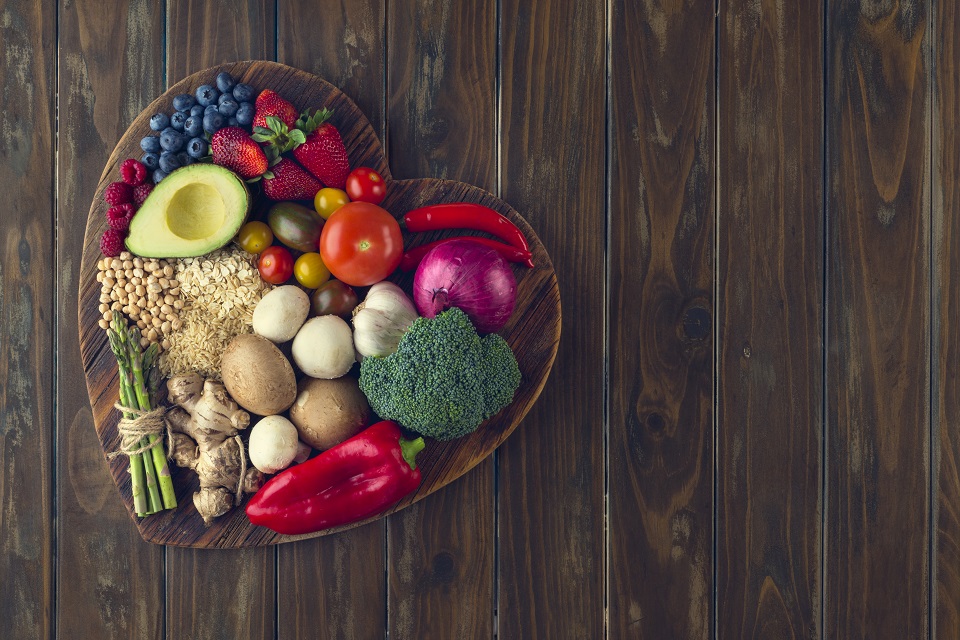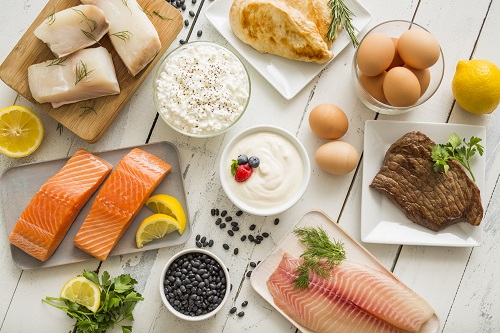Kick Start Your Kidney Diet in the New Year

Take advantage of the “new year, new you” energy that you might be feeling from your friends and family this year by thinking about healthy diet choices you can make for your kidney health. We get it: Following a diet can be difficult, especially when you’re not used to monitoring and tracking your food intake. But understanding your dietary and health needs can help you plan and stick to your kidney diet.
Cooking vs. Eating Out 
Cooking at home can offer more control over the nutrients you’re eating, and meal prepping kidney-friendly recipes can also save you time. Consider preparing a few different recipes that can be frozen and reheated. Keeping a variety of options easily available can help you avoid meal boredom and can help you stay on track. Discover recipes and ideas in DaVita’s cookbooks!
You can still stay on track while eating out. Reviewing nutrition information from your favorite restaurants will help you order healthy options. Just remember that food from restaurants is often higher in sodium and phosphorous.
Protein
 Did you know that your protein needs are often higher if you’re on dialysis? Choosing high-protein foods can help you meet your protein goals, but remember that not all proteins are created equal. Opt for lean meats like chicken or fish and low-fat dairy products. Milk, cheese, eggs, fatty red meat, beans and peas can be higher in cholesterol and/or phosphorus.
Did you know that your protein needs are often higher if you’re on dialysis? Choosing high-protein foods can help you meet your protein goals, but remember that not all proteins are created equal. Opt for lean meats like chicken or fish and low-fat dairy products. Milk, cheese, eggs, fatty red meat, beans and peas can be higher in cholesterol and/or phosphorus.
If you have kidney disease but are not on dialysis, you may need to limit your protein intake. Talk with your healthcare provider to determine what protein intake is best for you.
Vegetables
If your goal is to lose weight or to eat healthier, including low potassium vegetables can help. Vegetables contain fiber which helps you feel full. Consider adding these low-potassium vegetables to your diet: cabbage, carrots, cauliflower, cucumber, eggplant, green beans and radishes.
Vegetables are also rich sources of antioxidants, elements that may prevent or delay cell damage. Due to their high antioxidant properties, vegetables have been associated with lowering the risk for various diseases such as cardiovascular disease.1
Fluids
Fluid control is important when following a kidney diet. If you are on a fluid restriction, controlling thirst and fluid intake can be difficult. Here are some suggestions to help you meet your new year goals:
- Limit high-sodium foods
- Use lemon wedges to increase saliva
- Chew gum
- Moisten your mouth with mouthwash
- Choose ice or frozen grapes instead of liquid
Healthy Rewards
Rewards can help you celebrate your success and reinforce the healthy changes you’re making. Consider healthy, non-food rewards like an aromatherapy session or a bubble bath. These self-care treats can relieve stress and align with your healthy-lifestyle goals.
Listen to your body
As with any change, listening to your body is a key component. Many times, hunger isn’t the reason we eat. Take a moment to determine why you’re eating: Is it hunger? Stress? Other emotions? Boredom? If you’re not truly hungry, consider ways to distract yourself from your desire to eat.
Remember, changing your diet for your kidney health isn’t a decision you make once at the beginning of the year – it involves making good choices every day. Post your goals somewhere visible, like on your refrigerator or pantry as a reminder and talk with your family and friends so they can support your changes. And remember to revisit your goals regularly. Understanding what you struggle with and learning more, whether from your doctor or through resources like the Kidney Diet Tips Blog, can help you continue making healthy choices throughout the new year!
Additional Kidney Diet Resources
Visit DaVita.com and explore these diet and nutrition resources:
- DaVita Food Analyzer
- DaVita Dining Out Guides
- Today’s Kidney Diet Cookbooks
- DaVita Kidney-Friendly Recipes
- Diet and Nutrition Articles
- Diet and Nutrition Videos
- Kidney Smart® Virtual Classes
This article is for informational purposes only and is not a substitute for medical advice or treatment. Consult your physician and dietitian regarding your specific diagnosis, treatment, diet and health questions.
Reference
- Antioxidants: In Depth. (2016, May 4). Retrieved December 20, 2019, from https://nccih.nih.gov/health/antioxidants/introduction.htm.
- Berue, S. (2012). Vegan Protein Powder Supplements of High Biological Value. Journal of Renal Nutrition, 22 (4). Retrived December 20, 2019. doi: 10.1053/j.jrn.2012.03.005
- Dietary Guidelines for Adults Starting on Hemodialysis. (2019, June 4). Retrieved December 20, 2019, from https://www.kidney.org/atoz/content/dietary_hemodialysis.
- Zha, Y., & Qian, Q. (2017). Protein Nutrition and Malnutrition in CKD and ESRD. Nutrients, 9(3), 208. Retrived December 20, 2019. doi: 10.3390/nu9030208

Recent Comments